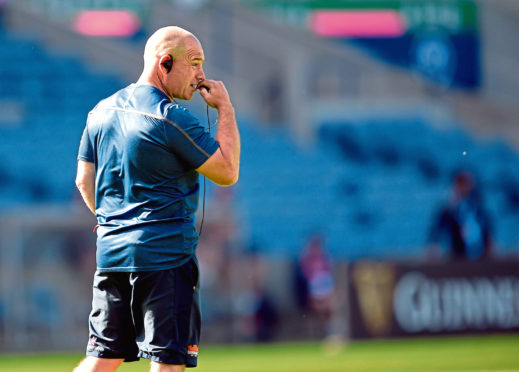Even in these parlous days when every coronavirus-depleted penny is a prisoner, someone found enough cash down the backs of the sofa cushions in the hospitality suites at BT Murrayfield to pay Richard Cockerill.
The Edinburgh head coach has signed a new two-year extension which will keep him at the club until 2023. This does not appear to have been a protracted negotiation process, with both sides pushing at the same open door.
Cockerill has been Mark Dodson’s best appointment. The former England and Leicester hooker came after a spell at Toulon and an unhappy end to his lifelong attachment to Leicester Tigers, and his reputation, somewhat overstated, was of a rugby rottweiler.
But he’s transformed the club root and branch. There is an atmosphere about Edinburgh now almost unrecognisable from the grey and directionless days pre-Cockers. Even changing from club colours from dreary red and black – and yes, occasionally grey – to Irn Bru orange and blue made a definite difference.
The new stadium quickly taking shape on the Murrayfield back pitches (Cockersfield? Stade Cockers?) should help further with the club’s identity. Crowds were already creeping up, already probably double what they were before he came, but even those greater numbers were still lost in the echoing big stadium.
But of course it’s on the field that the difference has been made, and the fact that they win consistently win matches now – even with a little flair at times – is what will inevitably attract a bigger support.
But whatever huge credit is given to the head coach for reviving a moribund franchise, the next stage is definitely going to be harder.
Cockerill made no bones about the depths to which the club had dropped, constantly referring to their previous league positions and the belief around the PRO14 that Edinburgh were an easy touch.
He’s restored a level of pride and tenacity in the club which means they’re taken for granted by no-one anymore, and on a European scale as well as in the regular domestic competition.
Cockerill has done exceptionally well in his meetings with Glasgow, which has been especially good for the club – his willingness to stir up the rivalry in the press and the effectiveness of the team’s performances against the Warriors – the latest coming in Saturday’s re-start games – has Glasgow fans desperately grasping for conspiracy theories that don’t exist: chief of which is that Edinburgh have a bigger budget than Glasgow, which hasn’t been the case since Andy Robinson days, and the opposite still applies.
But while beating Glasgow like a drum of late makes Edinburgh fans feel great, it needs something more than that. Cockerill’s other great achievement in his time at the club was taking them to the quarter-final of the Heineken Champions’ Cup, but they blew their audition that day against Munster.
The effort spent getting to that stage meant they missed out on the big competition the following season – the one we’re just finishing. Cockerill’s evident and often dismissive distaste of the Challenge Cup, where Edinburgh have a quarter-final upcoming, shows what he wants to be judged on.
Therefore the third contract he’s signed at Murrayfield is a crucial one – it’s time to take the club beyond simple respect and wins over Glasgow. Next week’s PRO14 semi-final against Ulster is the first measuring stick.
An example of Cockers in action
Your scribe doesn’t usually keep a penalty count in games – there’s more than enough plates spinning in any live match report – but it was necessary at least for the first half on Saturday.
The new breakdown interpretations – really, just a hardening of what the laws already state – were in place, and penalties had been endemic in other restart games since lockdown.
Sure enough, turning to the count just 10 minutes into the game and there were seven “pings”. Six against Glasgow, one against Edinburgh.
Richard Cockerill had paid special attention to other games and knew what was coming, so he drilled the new regulations into his team and had his ball stealers primed. The result was all those penalties and the foundation of a 6-0 lead without undue effort – a crucial little advantage given it took an hour in the end for Edinburgh to get completely on track.
Moving on with professionalism
It’s 25 years since rugby went pro and there are still some fighting the battle, like Japanese WW2 soldiers who won’t surrender.
“We lost something that day in Paris in 1995.” Yeah, maybe, but it’s gone forever at the elite end of the game. There’s plenty opportunity to re-set it in the grassroots if we wanted – a clear demarcation between amateur and pro.
The idea that the old amateur game had some sort of vague integrity which is now lost is sepia-tinged nonsense – there were no real amateurs left then.
Rugby, and other former amateur bulwarks like the Olympics, is better for professionalism and better played to boot. Tempus fugit.
